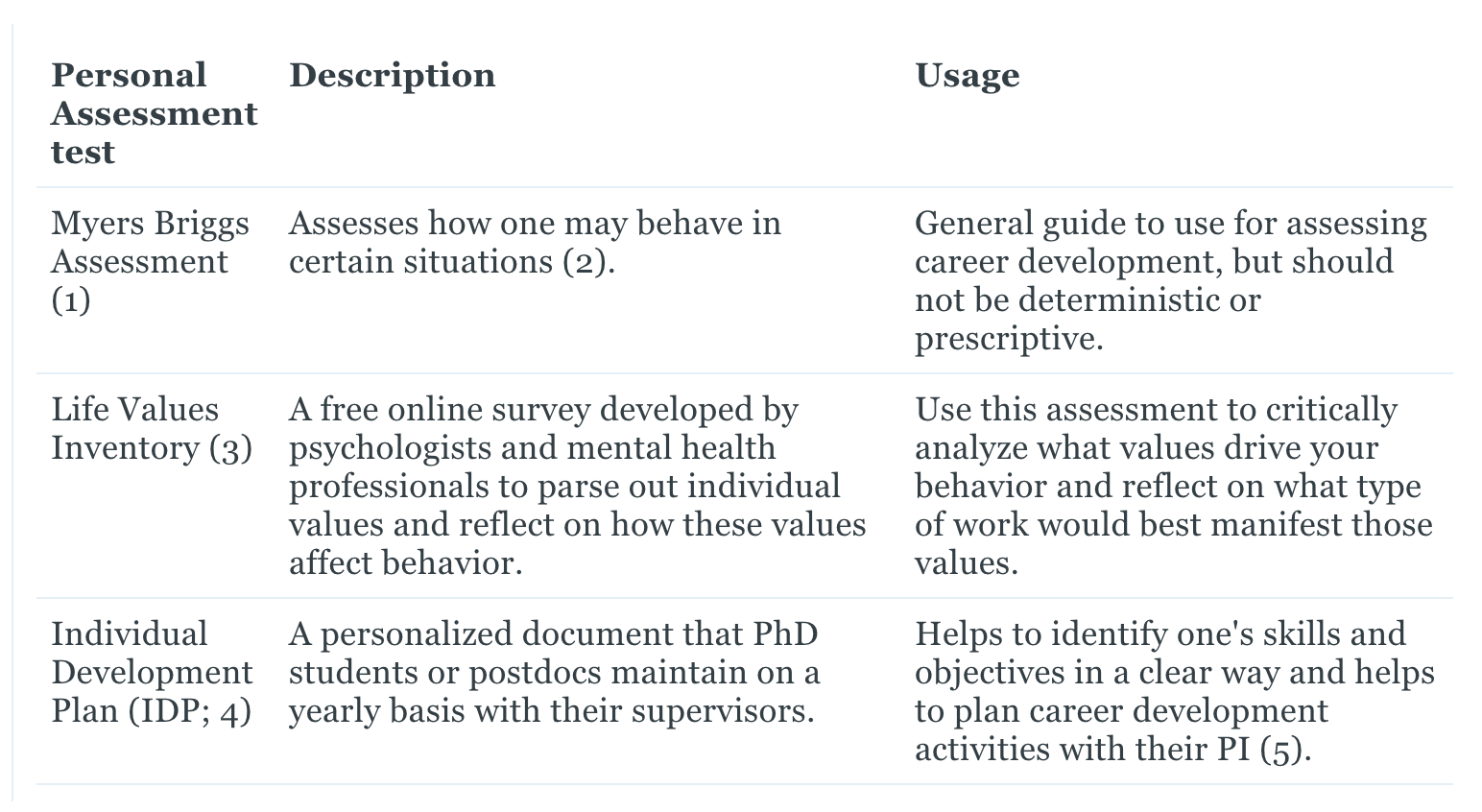Career development is the process of working towards a meaningful career. Identifying what meaningful work is for each individual requires deep reflection, assessing and improving one’s skill sets, exploring diverse career options, participating in relevant experiences, and connecting with professionals who work in your selected fields as early as possible. This may seem like a daunting task, but you can take comfort in the fact that you are not alone. While many of us are aware that everyone needs to take responsibility to further their careers, PhD students and postdoctoral researchers often take very little time off from research to actively tackle personal development goals. Here, we provide a few tips on what researchers can do to further their careers.
Occasionally taking some time away from research to develop additional expertise is crucial and will help, not hurt, your professional success.
As a first step, it is crucial to undertake personal reflection to understand your strengths and abilities, assess your personality, and identify which skills need improvement. Personal assessment tests reveal the diversity of working styles and how each individual can be successful (Box 1). Furthermore, when it comes to working in a group, these tests provide an overview on how to manage one’s professional skills, improve their communication style and leadership skills, and help learn to troubleshoot interpersonal conflict that ultimately helps teams function more smoothly.

Box 1. Three popular personal tests.
(1) Myers Briggs Assessment.
(2) Determine your personality type.
(3) Life Values Inventory.
(4) Individual Development Plan.
(5) Identify your skills and objectives.
Postdocs aspiring to delve into an academic career need to realize that most of their time as a young investigator will be spent beyond the bench while writing grant applications, serving in different committees, managing finances, teaching and mentoring. Many will feel they are unprepared for their new duties, and that their training as a postdoc isn't as multifaceted as they might like it to be. Fortunately, it is never too late to take charge of your own professional development. Understanding that occasionally, taking some time away from research to develop additional expertise is crucial and will help, not hurt, your professional success. Here are a few tips to increase your chances of pursuing an academic career:
- Actively participate in professional development initiatives in your lab/department/institution, such as graduate and postdoctoral committees and organize journal clubs.
- Learn to give chalk talks on your research proposal, which is a vital part of faculty interviews.
- Take advantage of free online resources such as CIRTL to improve your teaching skills and help with teaching and evaluation of coursework. Gain experience in mentoring by supervising undergraduate, masters and PhD students.
- Join graduate and postdoctoral groups on online platforms such as GradSlack and Future_PI_Slack for career development discussions and resources.
- Participate in outreach activities to policymakers and the public, which helps in acquiring effective communication skills and advocacy for your work.
- Apply for external funding, which not only provides some level of independence from your supervisor but also enables you to gain valuable experience that you can reflect on if applying to career transition awards into faculty positions.
- Participate in grant writing with your supervisor and attend grant writing workshops.
- Plan the budget for your project and discuss with your supervisor how they manage finances for bigger projects.
If you are interested in a non-academic career, a wide range of options await you - from pharmaceuticals and biotech industry; to public health organizations, science policy and consulting; to teaching, science communication and science journalism. While each of these streams have the common element of science and require your valuable research and critical thinking skills, they vary greatly in their day-to-day work style, job requirements and personality types. Personal assessment tests play a major role here in identifying your unique skill set, interests and passion. It is important to build towards a career that matches your interests, goals and personality.
How do you decide which track to take up beyond research? If you have a long-term career goal and a deep passion for a particular type of work, cultivating your skill set and relevant experiences early on can increase your chances of smoothly transitioning into your dream career. On the other hand, since it takes time to realize one’s passions, you could also pursue a “trial-and-error” approach by exploring different paths through internships, or informational interviews. Even among these two approaches, one could fit some of us better than the other. There is no one size that fits all. Here are a few tips that can help you in this important career transition.
- Identify and talk to professionals who have transitioned successfully into careers that interest you. Reach out on LinkedIn and use the “informational interview” format referenced above for a structured conversation. Remember to do your homework before you organize these conversations to convey sincere interest. Sometimes an informational interview can be your door into a company.
- Embark on individual career counseling, which may be offered by your university’s career development, graduate student or postdoc office.
- Scan through job ads to identify required skills and work on building them as early as possible.
- Participate in professional development activities offered by scientific societies, universities, career development offices, and discipline-specific groups. Seek out or organize career day workshops and attend job fairs.
- Talk to your advisor to see if they can help with opportunities or support your plans for performing internships in non-academic roles such as administration, industry, writing, or policy. Ask if they have contacts in their network that could help secure such opportunities.
- Follow programs that interest you on Twitter or subscribe to newsletters to stay up to date on events.
- Frame your potential career crisis as a career adventure. What areas of professional life do you want to explore? It is possible to create a meaningful and rewarding work-life balance!
Actively seek out mentors other than your advisor, with whom you can readily connect and who are in careers or fields that you aim to pursue
It is important for supervisors and mentors to actively participate in their trainees’ career paths. It may not be easy for students to talk about non-academic careers if their advisors are entrenched in academic life. Research advisors may not even be aware of a range of career options available. To overcome this, actively seek out mentors other than your advisor, with whom you can readily connect and who are in careers or fields that you aim to pursue. While it may be difficult for some advisors to come to terms with a student moving to a non-academic role after years of training, it should actually be taken as a positive development. Advisors must be aware that academic positions are far and few between. Moreover, analytical and quantitative skills are required in almost every organization and by imparting rigorous training to their students and postdocs, research advisors are in fact playing a vital role in collectively moving the society forward.
In a nutshell, work on your own career development as early as possible and do not stop after landing your dream job. Continue to network and develop your professional skills throughout your career and this will get you ready when the next opportunity knocks on your door. Listen to your own aspirations and think deeply on what feels like the right career for you. Finally, openly talk with your mentors, colleagues and career development offices, who will guide you towards opportunities to take your career to the next level.
Editor's note: If you have a hard time with self-reflection and/or self-assessment and would like to take a guided step-by-step approach, Nele Haelterman highly recommends Melanie Sinche's book "Next Gen PhD: A Guide to Career Paths in Science".
About the authors:
Sundar Ram Naganathan is a HFSP postdoctoral fellow at EPFL, Lausanne, with a PhD in biophysics from MPI-CBG, Dresden. He studies symmetries and asymmetries in embryonic development using zebrafish as a model system. He is an ardent advocate of open science, is an active preLighter, an eLife Community Ambassador and an Ambassador for ASAPbio and protocols.io. Connect with Sundar on Twitter.
Amanda Hurley is currently a postdoctoral associate at the University of Wisconsin - Madison and she received a PhD in Molecular Biology from Princeton in 2017. In addition, Amanda is an eLife Community Ambassador and serves as the Professional Development chair for her local science policy group, Catalysts for Science Policy, and sits on the board of the early career research nonprofit, Future of Research. Connect with Amanda on Twitter.
Sarvenaz Sarabipour is an assistant research scientist at Institute for Computational Medicine, Johns Hopkins University, United States. Connect with Sarvenaz on Twitter.
Adriana Bankston is a Principal Legislative Analyst in the University of California (UC) Office of Federal Governmental Relations. In addition to working at UC, Adriana serves as Co-Director of the Policy Taskforce at Future of Research (FoR), is Chief Outreach Officer at the Journal of Science Policy and Governance (JSPG), and a Biomedical Workforce & Policy Research Investigator at the STEM Advocacy Institute (SAi). Connect with Adriana on LinkedIn and Twitter.







